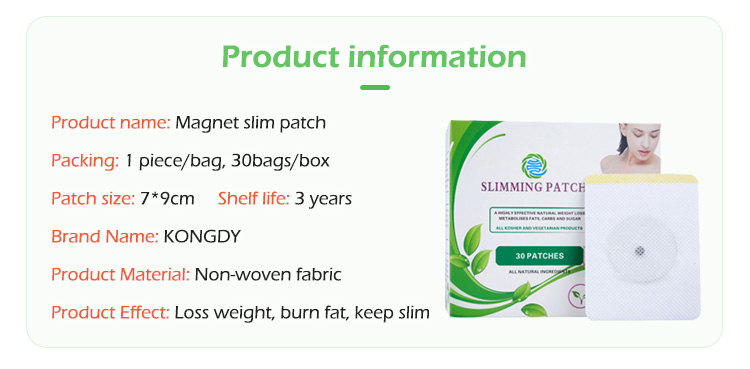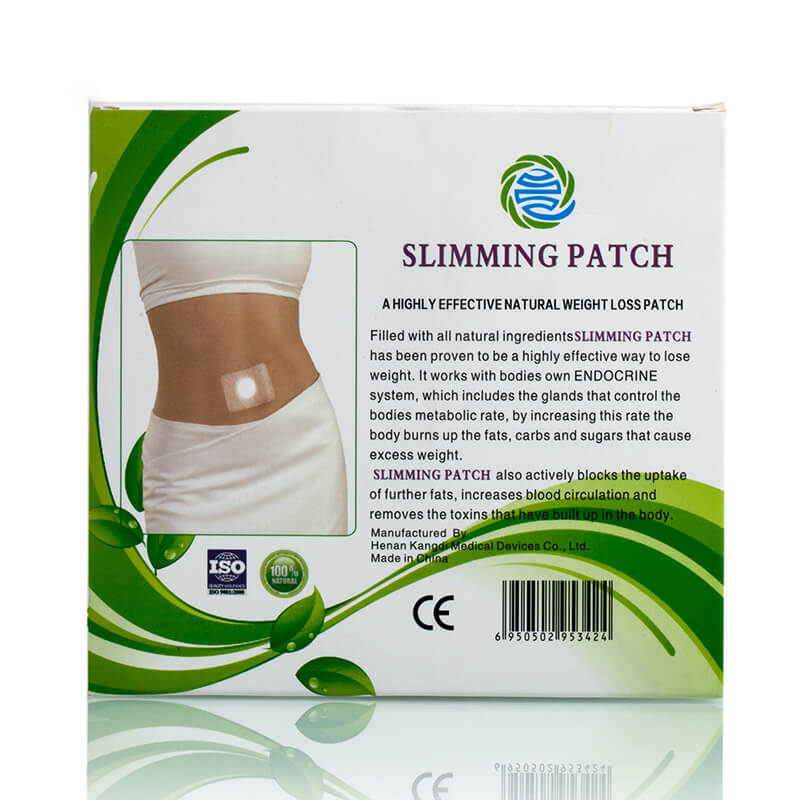How Does Private Labeling Work with Magnetic Slimming Patches?
Private labeling has become an essential business model for many companies, especially in the health and wellness industry. For businesses looking to enter the magnetic slimming patch market, private labeling offers an efficient way to launch their own branded products without the need for in-house manufacturing. In this article, we will explore how private labeling works with magnetic slimming patches and why it can be a highly advantageous strategy for your business. Additionally, we’ll discuss the key steps involved in partnering with a Magnetic Slimming Patches Manufacturer, OEM, or Supplier to create your own unique product line.

1. What is Private Labeling?
Private labeling is the process by which a company purchases products from a manufacturer and sells them under its own brand. The manufacturer produces the goods based on your specifications or standard formulations, but the product is branded with your logo, packaging, and brand name. In the case of magnetic slimming patches, you work with a Magnetic Slimming Patches Manufacturer or OEM (Original Equipment Manufacturer) to create products that carry your brand identity.
Unlike custom magnetic slimming patches where you might have more control over the ingredients and formulation, private label products are often pre-developed and ready for branding. However, you can still customize the packaging, branding, and marketing to make the product distinctly yours.
2. The Private Labeling Process for Magnetic Slimming Patches
The process of private labeling magnetic slimming patches involves several critical steps. By understanding these stages, you can better navigate the relationship with your Magnetic Slimming Patches Supplier and ensure your brand's success in the market.
Step 1: Choosing the Right Manufacturer or OEM
The first step is finding a reputable Magnetic Slimming Patches Manufacturer or OEM. It’s crucial to choose a partner with experience in producing high-quality magnetic slimming patches. A good Magnetic Slimming Patches Supplier will provide you with a range of private label options that meet your business needs. Look for manufacturers with a strong track record of quality control, reliable production processes, and the ability to meet your branding requirements.
Step 2: Selecting a Product Formula
Most Magnetic Slimming Patches OEMs offer several formulas and product variations to choose from. You can select a formulation that aligns with your target audience, whether it's focused on metabolism boosting, fat burning, or appetite suppression. While the formula may already be set by the manufacturer, you still have the flexibility to choose from different product features, such as magnetic strength, ingredients, and the duration of patch efficacy.
For example, you may decide to offer patches that include natural ingredients like green tea extract, which is known for its fat-burning properties, or you might select a patch that has stronger magnetic technology to improve slimming results. This is where collaboration with your Magnetic Slimming Patches Supplier becomes important.
Step 3: Customizing the Packaging and Branding
Private labeling offers complete flexibility when it comes to packaging and branding. Once you have selected the patch formula, the next step is to design the packaging. This is your opportunity to create a strong brand identity that reflects your business's values and appeals to your target customers.
Your Private Label Magnetic Slimming Patches should have packaging that is both attractive and informative. You can work with your Magnetic Slimming Patches Manufacturer to develop packaging that includes your logo, brand colors, and any marketing messages you want to highlight, such as "natural ingredients" or "scientifically proven." Many Magnetic Slimming Patches OEMs offer packaging solutions that meet different market standards, whether you need eco-friendly materials or specialized packaging for specific retail requirements.
Step 4: Compliance with Regulations
One of the key advantages of working with a Magnetic Slimming Patches Manufacturer is that they are typically well-versed in the legal and regulatory requirements for health and wellness products in different markets. Your supplier will help ensure that your private label magnetic slimming patches meet industry standards and comply with local regulations, such as proper labeling, ingredient listing, and product safety testing.
Having a trusted Magnetic Slimming Patches Supplier can help you avoid potential legal issues and ensure that your product is ready for sale in various countries, meeting both local and international standards.
Step 5: Launching and Marketing Your Private Label Product
Once your private label magnetic slimming patches are manufactured and packaged, it’s time to launch them into the market. This is where your branding and marketing strategies come into play. Whether you plan to sell your products online or through physical retail channels, your ability to effectively market the product will determine its success.
Consider collaborating with influencers, running social media campaigns, and offering discounts or special promotions to attract new customers. The fact that your product carries your branding will make it easier to build a loyal customer base, as people begin to recognize and trust your brand over time.
3. The Advantages of Private Label Magnetic Slimming Patches
There are several compelling advantages to private labeling when it comes to magnetic slimming patches:
Faster Time to Market
Private labeling allows you to bypass the lengthy process of product development and testing. Instead of spending months or even years developing your own product from scratch, you can work with a Magnetic Slimming Patches OEM to quickly bring a high-quality, pre-formulated product to market. This significantly shortens the time it takes to start generating revenue.
Lower Costs
Developing a custom product can be expensive, especially if it involves research and development, testing, and sourcing of unique ingredients. Private label products are more cost-effective since the Magnetic Slimming Patches Manufacturer handles the production, and you only need to focus on branding and marketing. Additionally, private labeling typically requires lower minimum order quantities, reducing the upfront investment required.
Brand Exclusivity
By offering Private Label Magnetic Slimming Patches, you create a product that is exclusive to your brand. This means customers can only purchase this specific product through you, fostering brand loyalty and helping you stand out in a competitive market. Your private label product can also be tailored to reflect your brand’s values, such as being organic, cruelty-free, or eco-friendly.
Quality Assurance
Working with an experienced Magnetic Slimming Patches Supplier ensures that your product is produced with high-quality ingredients and under stringent quality control. Most Magnetic Slimming Patches Manufacturers have established production protocols to guarantee consistency in their products. This ensures that your private label slimming patches will meet customer expectations for quality and performance.
Flexibility in Scaling
Private labeling also offers scalability, allowing you to start small and increase production as your business grows. You can test your private label magnetic slimming patches in a limited market before scaling up to meet higher demand. This flexibility reduces the risk of overproduction and helps you manage inventory effectively.
4. Common Challenges with Private Labeling and How to Overcome Them
While private labeling offers many benefits, there are also some challenges that businesses should be aware of:
Lack of Control over Formulation: Private labeling typically involves using the manufacturer’s existing formulations, which means you may have less control over the product’s ingredients compared to custom manufacturing. However, you can still work with the Magnetic Slimming Patches OEM to select a formula that closely matches your brand’s goals.
Limited Differentiation: Since private label products are based on pre-developed formulas, there is a risk of limited differentiation from other brands using the same manufacturer. To overcome this, focus on creating unique branding, packaging, and marketing strategies that make your product stand out.
Regulatory Compliance: Navigating product regulations can be complex, especially if you plan to sell internationally. To mitigate this, partner with a Magnetic Slimming Patches Manufacturer who is experienced in regulatory compliance and can guide you through the necessary steps.
Conclusion
Private labeling offers an efficient, cost-effective way to enter the growing market for magnetic slimming patches. By working with a reputable Magnetic Slimming Patches Manufacturer or OEM, you can launch a branded product that aligns with your business goals and meets the needs of your target audience. From selecting a formula to designing packaging, private labeling allows you to bring a unique, high-quality product to market quickly and efficiently. With the right partner, you can successfully establish your brand in the competitive slimming patch industry.
Frequently Asked Questions (FAQs)
Q1: What is the difference between private label and custom magnetic slimming patches?
A: Private label patches use pre-developed formulas branded under your company, while custom patches are fully developed according to your specific requirements, including ingredients and design.
Q2: How can a Magnetic Slimming Patches Manufacturer help with regulatory compliance?
A: Manufacturers typically ensure that the product meets local and international regulations, helping with ingredient labeling, product safety standards, and packaging requirements.
Q3: Can I change the formula when private labeling magnetic slimming patches?
A: Private label products usually come with pre-set formulas, but you can choose from different options provided by the manufacturer.
Q4: How long does it take to launch a private label magnetic slimming patch?
A: The time frame depends on factors such as branding, packaging design, and production schedules, but private labeling typically allows for faster market entry compared to developing a custom product.
Q5: Why is private labeling cost-effective?
A: Private labeling reduces the costs associated with product development and allows businesses to start with lower minimum order quantities, minimizing initial investment.






